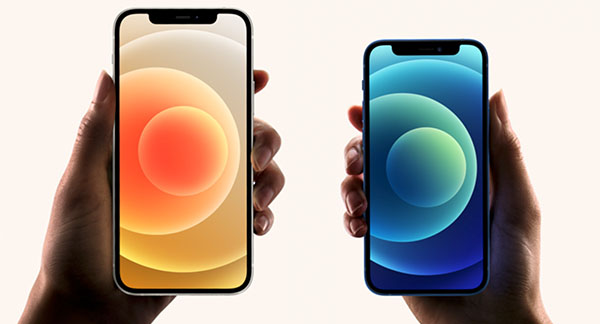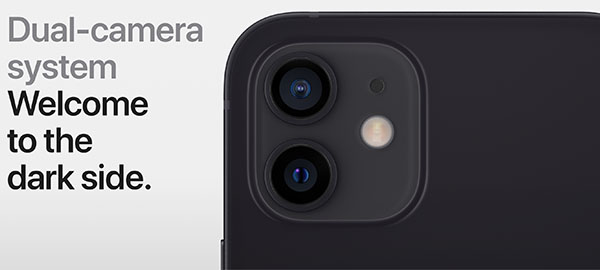Apple announces iPhone 12 smartphones: 4K HDR recording, improved image quality and ProRAW format
posted Tuesday, October 13, 2020 at 3:30 PM EST

Apple today announced its iPhone 12 family of smartphones, including the iPhone 12 mini, iPhone 12, iPhone 12 Pro and iPhone 12 Pro Max. The former two phones include dual cameras and the latter two, like last year's iPhone 11 Pro and Pro Max models, include an array of three cameras, plus a new LiDAR scanner.
Let's tackle the iPhone 12 mini and iPhone 12 first. These devices have 5.4-inch and 6.1-inch Super Retina XDR displays, respectively. Each display is HDR capable and utilizes OLED display technology. The iPhone 12 mini has 476 ppi resolution, whereas the iPhone 12's display deliver 460 ppi resolution. They each boast 2,000,000:1 contrast ratio, as OLED displays are lit on a per-pixel basis, offering true black display. Max brightness has been improved compared to the iPhone 11, with the iPhone 12 mini and 12 offering 1200 nits max brightness when displaying HDR content.

In terms of photographic capabilities, the iPhone 12 mini and iPhone 12 have identical offerings. They both have a dual 12-megapixel camera system with Ultra Wide and Wide focal lengths. The Ultra Wide lens has a maximum aperture of f/2.4, and the Wide lens has a max aperture of f/1.6. With increased processing power, both phones offer Night mode and Deep Fusion image processing technology. The 2x optical zoom includes optical image stabilization. Apple promises a brighter True Tone flash thanks to Slow Sync capabilities. Like all iPhone 12 models, the 12 mini and 12 include Apple's Portrait mode with advanced bokeh and depth control. Portrait mode includes six effects: Natural, Studio, Contour, Stage, Stage Mono and High-Key Mono. Software-driven Smart HDR 3 is also included.

Video features are likewise identical between these two models. Each phone records 4K video at 24, 30 or 60 frames per second and record 1080p video at 30 or 60 fps. They can record 10-bit HDR video with Dolby Vision at up to 30 fps, although a non-HDR extended dynamic range option is available at up to 60 fps. Video is stabilized using optical image stabilization. For slow motion video, you can record Full HD resolution at 120 or 240 fps. Time-lapse video recording is available, with stabilization, in traditional shooting modes and in night mode. Audio is recorded using stereo microphones and includes audio zoom functionality.
Moving to the iPhone 12 Pro models, they're a bit different from one another. Besides the obvious difference in screen size, with the Pro including a 6.1-inch Super Retina XDR OLED display and the Pro Max offering Apple's largest iPhone display ever at 6.7 inches, their camera offerings vary.

The iPhone 12 Pro has three cameras, like the iPhone 11 Pro, with Ultra Wide, Wide and Telephoto focal lengths. From Ultra Wide to Telephoto is 4x optical zoom. The iPhone 12 Pro Max, on the other hand, has a longer Telephoto lens, offering 5x optical zoom. In terms of equivalent focal length, the difference between telephoto lenses is 52mm versus 65mm. The tradeoff for the extra reach is that the Pro Max's telephoto lens has an f/2.2 aperture versus the f/2.0 aperture in the iPhone 12 Pro's 52mm equivalent lens.

iPhone 12 Pro Max has even better camera technology overall. It utilizes a 47% larger image sensor, resulting in an 87% improvement in low light image quality, according to Apple. The company claims the 12 Pro Max has Apple's best camera ever. The Pro Max's larger sensor incorporates sensor-shift image stabilization, rather than the optical image stabilization found in the smaller iPhone 12 Pro model. Apple states that the sensor stabilization system delivers five times the micro adjustments per second of its traditional optical image stabilization system.
Both iPhone 12 Pro models incorporate a new feature, the new Apple ProRAW image format. This feature, coming later this year to iPhone 12 Pro and Pro Max, combines Apple's Smart HDR, Deep Fusion and additional technologies to give photographers total control over the color, detail and dynamic range of their images. ProRAW files will be editable in the native Photos app, plus third-party apps. Apple is making an API for developers now.

Like the iPhone 12 mini and iPhone 12, Pro and Pro Max models include a brighter True Tone flash with slow sync, Portrait mode, Portrait Lighting and Smart HDR 3 features. Unlike its more affordable siblings, however, the Pro and Pro Max incorporate a LiDAR Scanner to build precise depth maps of a scene. This is great for augmented reality, but also works to improve autofocus in low light scenes. In fact, Apple states that LiDAR-assisted autofocus is six times faster in low light and improves depth calculations when using Night More for portraiture.
Video features in the iPhone 12 Pro models is improved as well. You can record 4K/60p video, but also HDR video at up to 60 frames per second with Dolby Vision. Further, you can edit HDR video right on your device, which is a big deal. Like with still images, the iPhone 12 Pro Max uses sensor-shift optical image stabilization when recording video as well, and it offers more optical zoom due to its longer telephoto lens.

iPhone 12 mini and iPhone 12 are available in 64GB, 128GB and 256GB capacities. They are available in blue, green, red, white, and black colorways. Prices start at $699 and $799 respectively. iPhone 12 Pro and Pro Max are available in 128GB, 256GB and 512GB capacities. These models are available in Pacific Blue, gold, graphite, and silver color options and start at $999 and $1,099 respectively. All iPhone 12 models include 5G compatibility, MagSafe wireless accessory compatibility and Apple's fastest smartphone chip ever, the A14 Bionic. Each model also incorporates Apple's new Ceramic Shield Front, which promises improved durability. Each model is also water resistant with an IP68 rating. For additional information, including preorder timing, visit Apple.com.